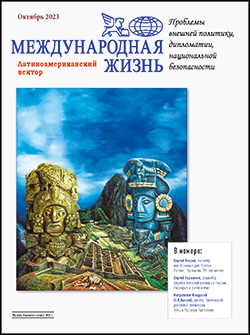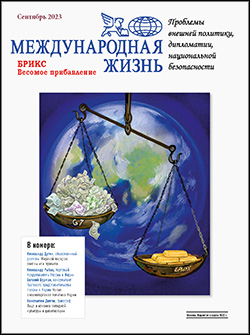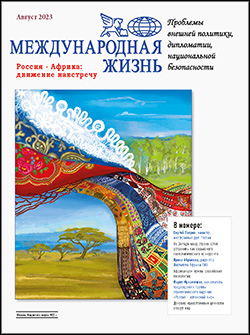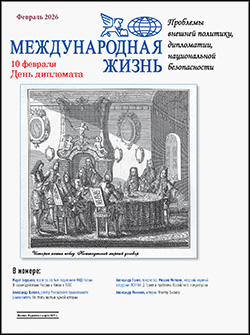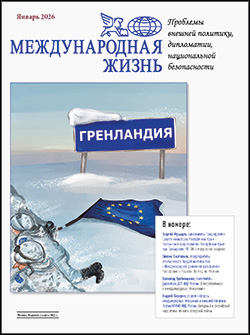S. Lavrov, Minister of Foreign Affairs of the Russian Federation
Russian Diplomacy and the XXI Challenges
The XXI century international relations evolve towards a polycentric configuration, meaning that no individual country, no matter how powerful, no camp akin to the Cold War political blocs, and no concert of the chosen few countries or centers of influence should expect to enjoy monopoly in global decision-making
POLITICS
I. Ivanov
The US-Russian Reset: a Tactical Move or a Strategic Choice?
Gauging the role given to the relations with Russia within the wider US foreign-policy agenda, one is left with an impression that, at least in the early days of the Obama Administration, engaging with Moscow was mainly seen in Washington in the light of other foreign-policy priorities
Yu. Korchagin, A. Rubinchik
En Route to A Strategic Partnership. The 40th Anniversary of the Trade Agreement Between Russia and Spain
The relations between Russia and Spain, which count five centuries of history, entered a new phase four decades ago, on September 15, 1972. Following a period of time during which the the diplomatic ties between the two countries were put on hold, Moscow and Madrid signed a trade deal and a package of accompanying agreements
N. Dyakova
Military Dimension of the Interactions Between the US and the CIS Countries
In the early 2000ies, Washington switched to a set of muscular policies in the post-Soviet space, the objectives behind them including the creation of a US foothold in Eurasia based on the trans-Atlantic partnership and the formation of a “sanitary cordon” of unfriendly republics around Russia
EDITOR'S COLUMN
A. Oganesyan
Great Power Influence Could Be Key to Stability
American author Anne O'Hare McCormick (1880-1954), whose life experience was interwoven with both world wars, packaged into a single phrase the lessons to be derived from the tumultuous epochs when she famously wrote: “Today the real test of power is not capacity to make war but the capacity to prevent it.” The new paradigm that fleetingly appeared to take shape crashed in no time, and it transpired that great power statuses would be steadily re-expressed in terms of nuclear deterrents, potentials for assured mutual destruction, and the abilities to sustain multiple regional armed conflicts in remote parts of the globe.
RUSSIA'S FOREIGN POLICY CONCEPT. VIEWS AND OPINIONS
A. Lukin
Russia Needs to Concentrate To Meet Foreign-Policy Challenges
In January, 2012, a quotation from A.M. Gorchakov, the foreign minister of Russia in 1856-1882, was built into the headline of V. Putin's re-election program titled “Russia is Concentrating: the Challenges We Must Respond To”. Surveying the problems which confronted Russia in the wake of the collapse of the Soviet totalitarian regime, the socialist economy, and the Soviet Union, Putin wrote: “We are not a country that ever feared to pick up a challenge. Russia is concentrating, it rebuilds its resources and boldly rises to whatever challenges it meets with. Russia has a convincing record of overcoming difficulties and winning regardless of circumstances, and it depends entirely on us how we meet today's challenges and seize the opportunities to become stronger and to reinforce our positions in the rapidly changing world”
A. Dugin
Multipolar World and Russia's Foreign Policy
Multipolarity is a completely practical project implying that Russia should spell out its national interests for an epoch to come, clearly formulate its key values, and daringly assert its uniqueness. Moreover, as a part of the design, Russia is to suggest that the whole world rethink many of the existing historical notions and approaches to the current international politics. In a sense, pressing for multipolarity means mounting a challenge of a philosophic character
TRENDS
L. Ternovaya
Retrograde Attitudes in International Relations
Illusory hopes and idealized visions of the past emerge nearly as often as rational solutions when attempts are made to cope with sweeping changes which threaten individuals and countries. Retrograde views being a part of the objective reality, they cannot be simply discounted but have to be interpreted as a reaction to absolutely real problems
S. Mirzakhanyan
Supranational Formations in the Contexts of Europe and Asia
Groups with widely varying levels of integration – NAFTA, ASEAN, Mercosul, UNASUL, CARICOM, CIS, etc - play prominent roles in modern international politics. The EU stands out from the list as the only formation supranational in the full sense of the word, considering the extremely broad range of authorities currently delegated to Brussels
V. Kotlyar
The Responsibility to Protect and the Arab Spring
The Brazilian initiative known as the Responsibility to Protect took shape as a natural reaction to the NATO misuse of the UN mandate issued on the basis of Security Council Resolution 1973 in March, 2011 with the goal of preventing the Gaddafi regime from sending the air force to attack the civilian population
THE ARAB DIRECTION
B. Dolgov
Evolution and Potential Outcomes of the Syrian Crisis
The crisis in Syria may fit into the general paradigm of the Arab Spring, but in many regards the distinctions outweigh similarities. In Tunisia, Egypt, and Yemen, the unrest was driven by domestic ills such as the continuous deterioration of socioeconomic conditions, rampant corruption in the ranks of the political elites which retained the grip on power for decades, and the lack of real democracy. In contrast, the conflict in Syria, a country nowhere nearly as burdened by the above problems, was detonated externally
A. Podtserob
Gaddafi As I Knew Him
Gaddafi was by all means a dictator, but one completely different from, for example, S. Hussein. While politically motivated executions occurred under the late Libyan leader, he refrained from mass political terror and used to treat gently his former political allies after they dropped out of his inner circle. Abdessalam Jalloud, Libya's number two political figure for a period of time, was discharged from the Libyan leadership after running into a conflict with Gaddafi but went on living unharmed in his Tripoli villa and even occasionally traveled abroad
THE RUSSIAN WORLD
M. Troyansky
Russian Brazil in Rio Grande do Sul
The Rio Grande do Sul state is widely believed to have been the first ever part of Brazil to host Russian settlers. The tide of the Russian emigration – the refugees fleeing from persecutions in their home country - reached Brazil in 1905-1907, though a number of Russian families evidently landed there earlier – in the last quarter of the XIX century among hundreds of thousands of immigrants from across the world
N. Danilevich
“I Was Born Under a Lucky Star”. On the 100th Birthday of Baron Falz-Fein
Baron Eduard Alexandrowitsch von Falz-Fein, a renown supporter of fine arts, lives in a mountainous area in Liechtenstein. His villa, densely surrounded by wisterias and firtrees, is located aside from a road sneaking into the mountains from Vaduz. The turn to the place is marked with a roadsign saying “Askania-Nova” and decorated with a picture of a horse head. Falz-Fein's favorite spot on premises is a sofa in the parlor facing the Alps via a floor-to-ceiling window. Eduard Alexandrowitsch talks cordially and displays a vivid sense of humor while showing keen interest in the conversation. He draws freely from the vast experiences that come with the impressive age to share his own life story and to discuss the history of Russia and the world.
THE WORLD AROUND
A. Karbovsky
Flags of the Foreign Ministry of the Russian Federation and of International Affairs Installed on Mount Elbrus
The flags of the Foreign Ministry of the Russian Federation and of International Affairs were installed on Mount Elbrus on September 2, 2012. The symbolic step was the first on record over the history of the Russian diplomacy and the 90 years of the existence of International Affairs
Читайте другие материалы журнала «Международная жизнь» на нашем канале Яндекс.Дзен.
Подписывайтесь на наш Telegram – канал: https://t.me/interaffairs

 12:13 08.09.2012 •
12:13 08.09.2012 • 